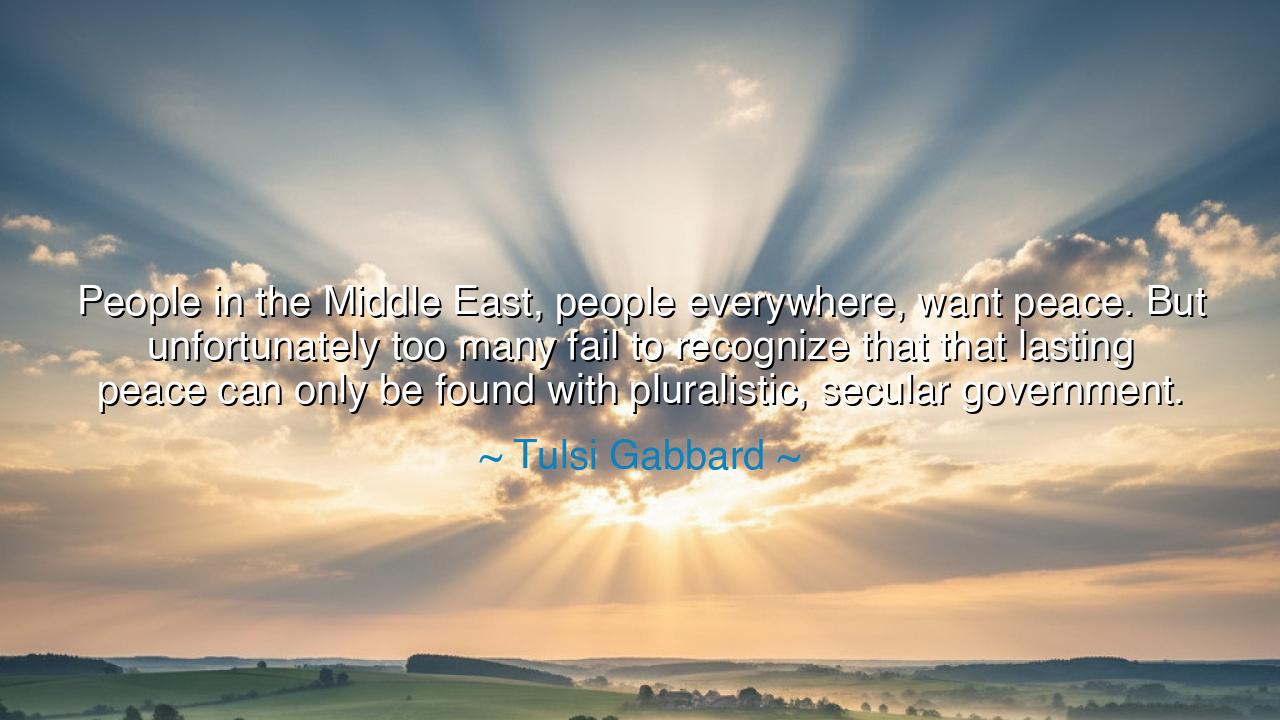
People in the Middle East, people everywhere, want peace. But
People in the Middle East, people everywhere, want peace. But unfortunately too many fail to recognize that that lasting peace can only be found with pluralistic, secular government.






In the solemn voice of truth, tempered by service and sacrifice, Tulsi Gabbard once declared: “People in the Middle East, people everywhere, want peace. But unfortunately too many fail to recognize that lasting peace can only be found with pluralistic, secular government.” These words, though born from the fires of modern conflict, carry the ancient weight of civilizations that have risen and fallen upon the same principle—that peace is not the child of conquest or creed, but of justice and equality. Her statement is both lament and prophecy, reminding the world that true peace cannot be imposed by faith, tribe, or empire; it must be built upon the foundation of freedom of conscience, where all beliefs may coexist under the rule of law.
In her lifetime, Tulsi Gabbard saw the terrible cost of war. A soldier who served amid the sands of Iraq, she witnessed firsthand how men and women—Muslim, Christian, and secular alike—longed not for dominance, but for safety, dignity, and home. From that crucible came her understanding: that people everywhere want peace, yet they are too often led astray by the poisonous illusion that peace can be secured through supremacy. Her words pierce through centuries of bloodshed to the heart of humanity’s greatest paradox—that while men invoke the name of heaven, they bring suffering to earth.
History bears witness to this truth with unflinching clarity. When the Caliphates of the early Middle East reached their height, they flourished not through domination, but through pluralism. The scholars of Baghdad studied the words of Greek philosophers; Jews, Christians, and Muslims alike worked side by side in the House of Wisdom. In those luminous centuries, knowledge became the bridge between faiths, and the sword slept beneath the scholar’s robe. But when tolerance gave way to zeal, when sects rose against sects and kings declared the will of heaven to justify their power, the golden age dimmed. What had been a garden of learning became a battlefield of doctrine. And so, as Gabbard warns, only in secular governance—where no single faith holds dominion over others—can peace take root and endure.
The same lesson was learned in the West through centuries of struggle. From the ashes of Europe’s religious wars, where Catholic fought Protestant and brother slaughtered brother, there arose the enlightenment ideal of separation between religion and state. Men such as John Locke and Thomas Jefferson proclaimed that conscience is sacred, that government must protect belief but never command it. Out of that wisdom was born the modern pluralistic state, where all faiths may flourish and none may rule. This is the meaning of Gabbard’s words: not an abandonment of faith, but the protection of all faiths through neutrality; not the silencing of religion, but its liberation from the grasp of politics.
And yet, her words are not bound to history alone—they echo painfully in the present. In lands where religion and power are entwined, peace remains fragile. The Middle East, weary of endless wars, has seen how sectarian rule breeds resentment and revenge. When one creed governs all, others suffer in silence or rebel in despair. But where pluralism is honored—where Sunnis, Shias, Christians, and secular voices can share the public square without fear—the soil of reconciliation begins to grow. The same truth applies everywhere, even in lands that call themselves free: whenever ideology seeks to dominate the state, the seeds of division are sown anew.
Tulsi Gabbard’s message is therefore both universal and urgent. It calls upon nations to understand that peace is not the absence of conflict, but the presence of justice. A secular government, in her vision, is not soulless or cold—it is the vessel through which every soul may live without oppression. For when law rises above faith, faith is free to rise toward God. The wise understand this harmony: that only by giving to Caesar what is Caesar’s, and to God what is God’s, can the two realms coexist without destroying one another.
So, my children of the modern age, take this teaching to heart. Seek not peace through domination, nor unity through uniformity. Let your societies be pluralistic, your hearts open, your governance impartial. Honor your own faiths, but respect the faiths of others, for diversity is not weakness—it is strength. When a nation protects all beliefs equally, it forges a peace that cannot be broken by sword or sermon.
Thus remember the wisdom of Tulsi Gabbard: the path to lasting peace lies not in the triumph of one belief, but in the protection of all. Build your nations upon the twin pillars of freedom and fairness, and you will find that even amidst the chaos of the world, peace can take root. For where the law guards equality, and the heart cherishes understanding, the dream of mankind—the dream of true and lasting peace—shall at last endure.






AAdministratorAdministrator
Welcome, honored guests. Please leave a comment, we will respond soon